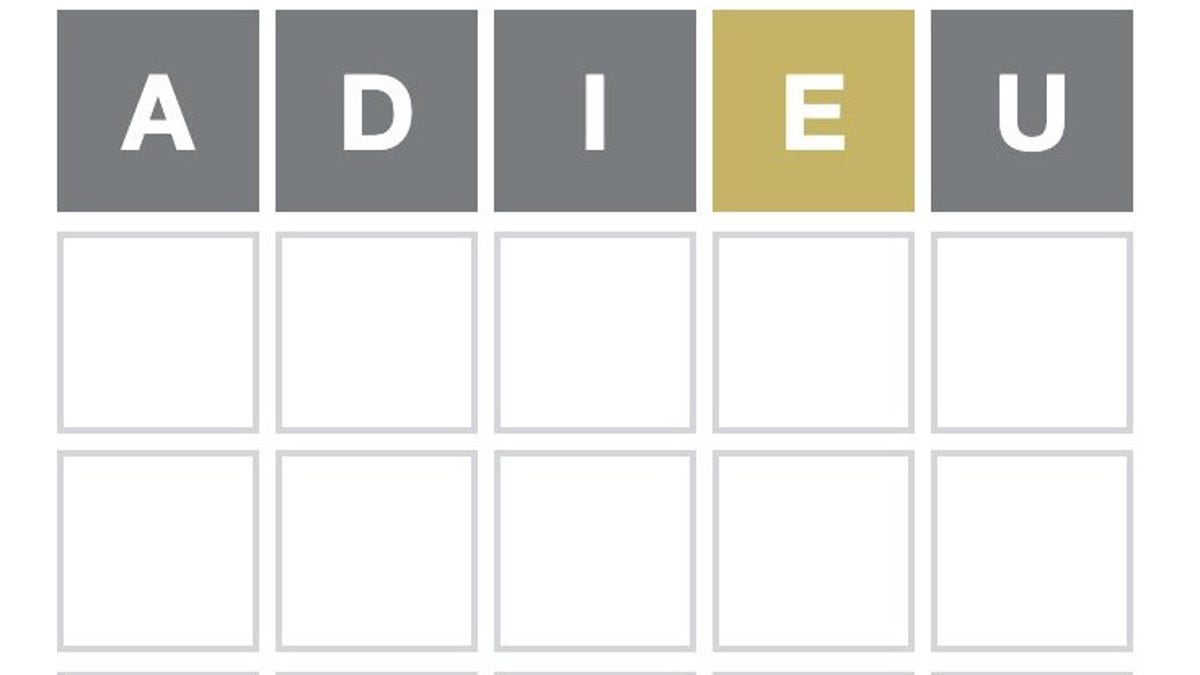Monday's Original Wordle Answer Couldn't Be More Controversial
Calling it "a coincidence" that the word was related to the biggest news event of last week, The New York Times tried to change it, but didn't fully succeed.

The New York Times tried to switch out Monday's Wordle answer, but not everyone saw the new version. (It wasn't ADIEU.)
Trying to take your mind off recent news events by playing a round of Wordle? You might want to rethink that.
The original Wordle answer scheduled for Monday was a word that's very connected to a certain major news event and, because of this, the newspaper tried to change it, but didn't fully succeed. (Stop reading now if you don't want to risk knowing the answer -- which may not even be the one your puzzle gives you.)
Early Monday, as the earliest East Coast Wordle fans were just getting the puzzle, the newspaper published an explanation. The tweet sounded innocuous enough. It read, "Some of you may have a different Wordle answer than the official answer. Please refresh your browser to receive the correct answer word. For more information, please read our editor's note."
Some of you may have a different Wordle answer than the official answer. Please refresh your browser to receive the correct answer word. For more information, please read our editor’s note. https://t.co/3dY5nRu7yu
— The New York Times (@nytimes) May 9, 2022
But when you get into the editor's note, you realize just how sensitive Monday's Wordle answer was, considering recent events. Some players saw the word FETUS as the puzzle's answer, while others saw the substitute word that Times tried to add in. (We won't reveal that one because it's not relevant to the story.) Of course, the word "fetus" may send many (most? all?) players' minds thinking of last week's leaked draft of a Supreme Court opinion that would strike down Roe v. Wade.
"Some users may see an outdated answer that seems closely connected to a major recent news event," is how the Times' editor's note put it. "This is entirely unintentional and a coincidence -- today's original answer was loaded into Wordle last year."
The Times' note went on to say that the newspaper wants its Games section to be a place of entertainment and escape, not tied to the news.
"But because of the current Wordle technology, it can be difficult to change words that have already been loaded into the game," the note went on to say. "When we discovered last week that this particular word would be featured today, we switched it for as many solvers as possible."
According to the note, players who refreshed their browser window, presumably since the NYT fix was made, will see the new answer, but not everyone does that.
Naturally, players had opinions.
"It would be so gross if the fun word game accidentally reminded people that their basic rights are being stripped away, rich people aren't supposed to have to think about that stuff, they're special," wrote one Twitter user.
Another person tweeted, "This shows how sensitive we can be towards current events and afraid of merely thinking about things. Even just mentioning one word related to a hot topic was too much for the NYT. Maybe we should be okay with coming across words that make us think."
Said another, "Josh would have NEVER let this happen," referring to Josh Wardle, creator of Wordle.
It would be so gross if the fun word game accidentally reminded people that their basic rights are being stripped away, rich people aren't supposed to have to think about that stuff, they're special
— Hemry, Local Bartender (@BartenderHemry) May 9, 2022
This shows how sensitive we can be towards current events and afraid of merely thinking about things.
— Nicholas Crabtree (@ncrabtreee) May 9, 2022
Even just mentioning one word related to a hot topic was too much for the NYT. Maybe we should be okay with coming across words that make us think.
Josh would have NEVER let this happen
— rando (@rando_handle) May 9, 2022
So you're saying you tried to abort and something went awry?
— @JesseForAthens (@JesseForAthens) May 9, 2022
You could have just taken a stand on the side of progress and support women. But no- you are apologizing. 👎🏻🤯
— HPNY KNITS (@hpnyknits) May 9, 2022
The things the NYT does worry about are often not the things the NYT should worry about.
— (((VirginiaJeff))) (@VirginiaJeff3) May 9, 2022
This isn't the first time a Wordle answer has been changed. Once the newspaper bought the game in late January, it began changing some of Wardle's preloaded answers.
At that time, New York Times communications executive Jordan Cohen said, "We are updating the word list over time to remove obscure words to keep the puzzle accessible to more people, as well as insensitive or offensive words."

